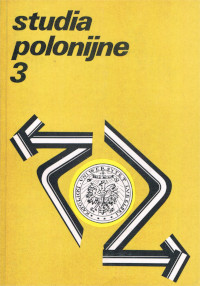The Activities of the Franciscans (OFMConv) among Polish Emigrants Emigrants 1772-1976
Main Article Content
Abstract
The activities of the Franciscans (OFMConv) among Polish emigrants are presented from a historical point of view. The work covers the period from the first partition of Poland (1772) to 1976. Since World War II work among Polish emigrants has been carried on by two provinces in Poland (the Cracow and the Warsaw provinces) and two Polish provinces in America, St. Anthony’s and St. Bonaventura’s. This mostly includes parish work, accompanied by cultural and social actions. Radio broadcasts and publishing are a special area of the Franciscans’ activity. The Outline presents a broad spectrum of the work of the Polish Franciscans among Polish emigrants throughout the world. In Europe (Ch. I), Polish friars have gradually built up their activity in Italy, Turkey, Roumania, the Soviet Union, Denmark, Germany, Belgium and England. In Italy they have been working since 1774, chiefly as confessors to Poles at St. Peter’s basilica in Rome and in the Franciscan sanctuaries of Assissi and Padua. Particularly devoted ministry has been conducted by Romuald Józef Filonowicz, the pastor of all Poles in Turkey, and Rafał Kiernicki, the pastor of the parish of Lwow, and two other Franciscans in the Soviet Union. Polish monasteries under the jurisdiction of the provincials residing in Poland have been set up in three European countries: at Santa Severa near Rome in Italy (1972). at Laxton Hall in England (1973) and in Essen in the German Federal Republic (1976). In America (Ch. II), the activity of Leopold Bonawentura Moczygemba, „the father of all Polish parishes in the United States”, was of outstanding importance for the Polish emigrants there. He founded the first Polish parish on American soil at a Texas settlement called Panna Maria, in 1855. Father Jacek Fu- dziński founded Polish monasteries associated with parishes, and in 1906 he set up the Polish Franciscan province in the Unitet States. Provincial Justyn Figas in 1931 started religious radio broadcasts, which are now continued by Kornelian Dende. Religious broadcasts in Polish, the so-called „Rosary Hour”, transmitted by about 50 stations, have been reaching several million listeners of Polish extraction in both the United States and Canada. In December 1973 the two Polish Franciscan provinces in the United States counted 450 friars working in 73 monasteries and 52: parishes. In Canada, a provincial custody was created in 1974 embracing four parishes in Montreal and a post of seasonal ministry in the parish of Wilno in Ontario. The Mission of Blessed Maksymilian Kolbe, set up by Augustyn Januszewicz in the town of Uruaçu (Brasil) in 1974, is planning to expand its ministry by opening a publishing house at Sao Antonio, not far from the capital city of Brasilia. The Franciscan activity among Poles in Africa and Asia (Ch. Ill) was reduced after World War II. Ministry to Poles has developed in Australia, where it was organized5 by Polish Franciscans from the United States and Poland. The ideas and personality of Blessed Maksymilian Kolbe had a strong impact on Polish emigrants, who- spread thoughout the world the Milicja Niepokalanej (Militia Immaculatae), an organization founded by Father Kolbe in Rome in 1917. The periodicals edited by Maksymilian Kolbe reached Poles everywhere in the world. The cult of Blessed Maksymilian Kolbe has united the Polish emigrants and become for them the source of moral strenght and the fondation of their bonds with their native land. This was in particular to be seen during the beatification in Rome on October 17, 1971 and in the course of the subsequent celebrations in the Polish emigration centres. In 1971 the Polish centre of the Militia Immaculatae at Santa Severa near Rome was granted the status of the Militia Immaculatae Central for all the Poles outside- Poland. The press organ of the Militia Immaculatae for Polish emigrants is the „Rycerz Niepokalanej”, revived in October 1971.

